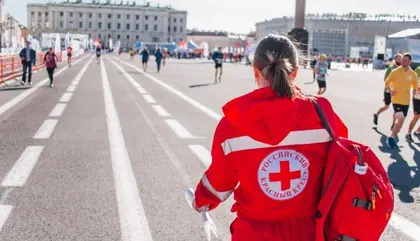The Russian Red Cross launched a fundraising campaign for the needs of families of conscripted Russian men and military personnel.
Dubbed #Myvmeste (Russian for we are together), the campaign seeks to help the families of the Russian men who are being sent to Ukraine to wage a war that has clear elements of genocide, seeking to conquer territories of an independent state with internationally recognized borders.
JOIN US ON TELEGRAM
Follow our coverage of the war on the @Kyivpost_official.
“We understand that the families of conscripted citizens are facing a host of difficulties right now,” the head of Russian Red Cross Pavel Savchuk said, adding that their families are “feeling anxious” and “require financial and humanitarian help,” and promising to provide psychological support on an individual basis.
Those interested in “alleviating the plight” of the families of Russian soldiers, many of whom are murdering, raping, and torturing Ukrainian soldiers and civilians as proven by multiple entities including those that are part of the United Nations, may officially donate via the platform: the default options include 500, 1200, or 1800 ruble amounts. Alternatively, one can suggest their own size of donation.
The Kyiv Post sent an email to the head office to comment on the situation as well as explain how they feel about supporting families of soldiers who deny the Ukrainians’ right to exist.
Responding to the Kyiv Post request, the ICRC (International Committee of the Red Cross) representative denied organization being directly involved in the fundraising campaign of the Russian Red Cross.

Thinking Out Loud – Where We’re at, What’s at Stake, and What Ronald Would Have Said
“Each national Red Cross and Red Crescent National Society around the world, including the Russian Red Cross and the Ukrainian Red Cross Society, respond to where the needs are greatest in their communities,” ICRC spokesperson stressed, adding that members of the Russian Red Cross have the remit to interact with their militaries and help civilians, including the families of military members.
“Part of the lifesaving work of National Societies includes interacting with the military to provide critical assistance to civilians and wounded soldiers, and their families…This is part of its core mission which is to ensure protection and assistance for victims of armed conflict and internal strife,” spokesperson added.
The International Federation of Red Cross and Red Crescent Societies (IFRC), meanwhile, sticked to the same position, stating that neither the IFRC nor the ICRC are involved in the domestic fundraising campaign mentioned.
“Each Red Cross and Red Crescent National Society around the world, including the Russian Red Cross and the Ukrainian Red Cross, respond where the needs are greatest in their communities,” IFRC representative replied. “As part of the International Red Cross and Red Crescent Movement, all National Societies are guided by seven fundamental principles, including impartiality. This means we save lives and prevent human suffering no matter who people are or where they live.”
The Red Cross’s track record in Russia’s war on Ukraine, despite some positivity, has drawn substantial criticism since Feb.24.
The Red Cross in Russia was reportedly caught distributing pro-Putin merchandise to Ukrainian refugees. The International Committee of the Red Cross President Peter Mauer’s visit to Moscow, where he met with Russia’s Foreign Minister Sergey Lavrov, likewise raised eyebrows.
Multiple reports, as well as calls intercepted by Ukraine’s Secret Service, show that a predominant part of Russians, including those already fighting in Ukraine, support the war and view Ukrainians as inferior.
Sociological data from Levada Center, an independent Russian polling and research company, further indicates that the majority of Russians support the war in Ukraine, with 63 percent of respondents considering the use of private military companies acceptable.
You can also highlight the text and press Ctrl + Enter






